Language Learning: German & French in Fribourg, Switzerland
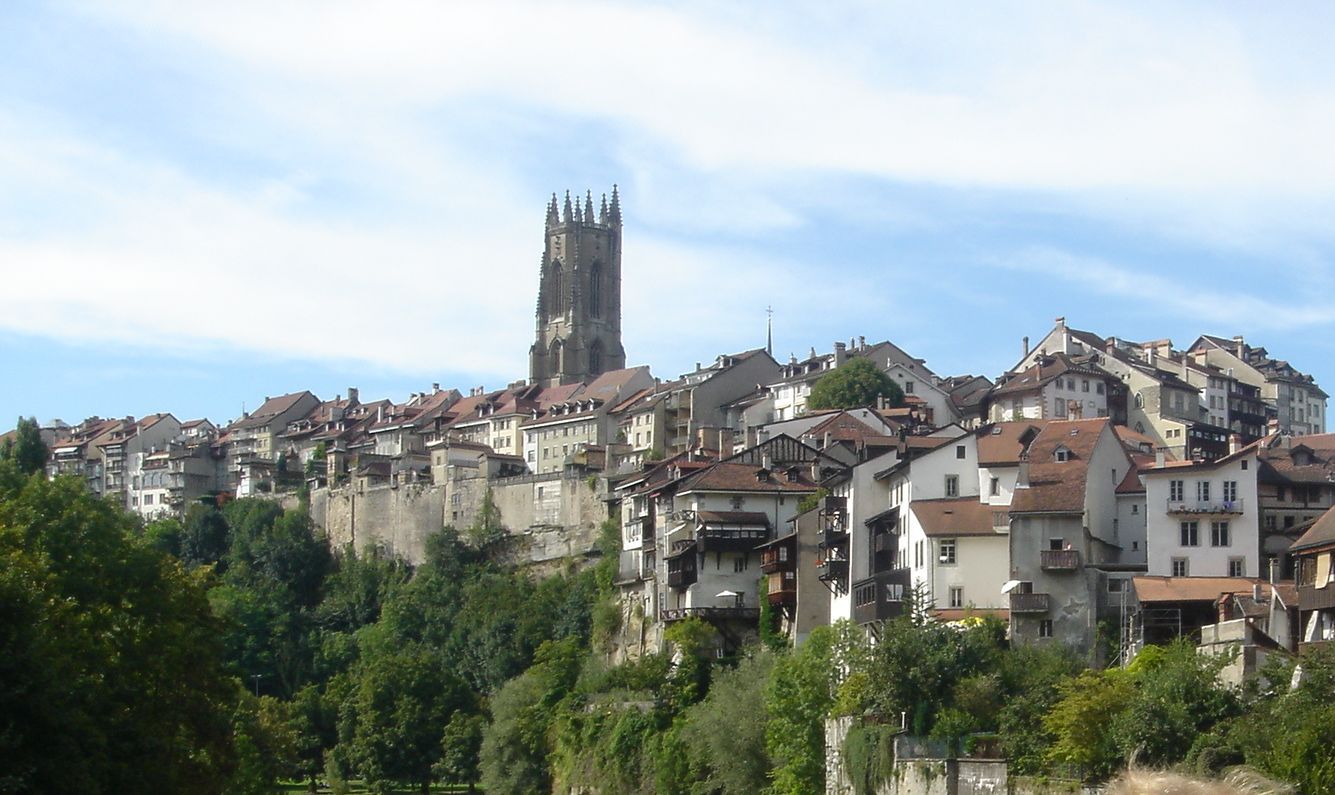 Ever thought about doing some language learning in Fribourg, Switzerland?
Ever thought about doing some language learning in Fribourg, Switzerland?
Visiting the town in Switzerland where I spent several years working in my first job, reminded me of my French language learning days. Fribourg or in German Freiburg (im Üchtland) is a bilingual city, and not to be confused with “Freiburg im Breisgau,” which lies in the Black Forest.
Pure immersion aficionados may well scoff at this: But working and learning French in a town where my native language German was well understood, had many advantages for me.
For one, I could always revert to German when my French instructions to the draftsmen in the structural engineering firm where I worked, were met with a doubtful stare.
Also, when the rapid French in a shop or restaurant was still beyond my listening skills, I could typically get a German, or Swiss-German translation, thereby generating “comprehensible input.”
CANTON FRIBOURG'S ROAD TO OFFICAL BILINGUALISM
The canton of Fribourg is one of three Swiss cantons that are officially bilingual. The other two are the cantons of Bern and of Wallis/Valais.
Fribourg entered the Swiss Confederation in 1481. Throughout the centuries both French and German were spoken in the region. For the canton of Fribourg the road to official bilingualism was a complicated one, with plenty of detours.
Since the early days, there have been various shifts. At first, German was the language used by the government (1483-1798).
Then betw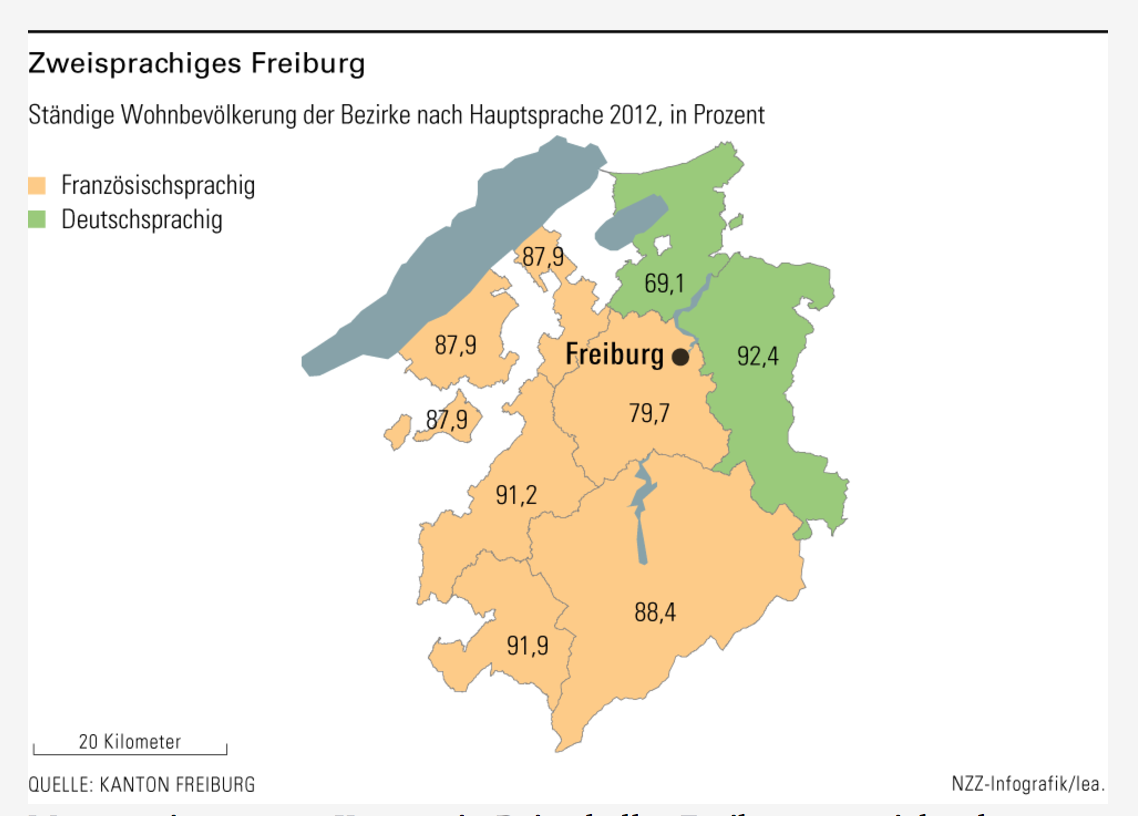 een 1798 and 1856,French and German alternated.
een 1798 and 1856,French and German alternated.
From 1857 on, both languages have had official status in Fribourg, but until 1990 only French was legally binding. Since 1991 both languages can be used for a binding contract.
Only the two north/northeast districts of the canton (of a total of seven), are predominantly German- speaking. It's more likely that residents of those districts learn and speak French, than residents of French-speaking districts learn German. (A possible reason? Many French speakers may be reluctant to learn Swiss-German.)
At this time, around 63% of the about 300,000 people in the canton of Fribourg speak French, 21% speak German, and close to 4 % speak Italian (which is not an official language in the canton).
A few years ago, the “Day of Bilingualism” (Journée du bilinguisme/Tag der Zweisprachigkeit) was set for September 26 and coincides with the European Day of Languages to foster language learning and bilingualism.
In the public schools of the canton of Fribourg, students learn a second language from grade three on. In communities where German is spoken, students are encouraged to learn French as the second language, and vice versa.
Nevertheless, in spite of such efforts and policies to foster bilingualism, language differences remain a point of discussion and sometimes also of controversy.
THE CITY OF FRIBOURG
The city of Fribourg is right on the language border between French and German. About 40,000 inhabitants live within the city proper. This number increases to 60,000, if adjacent suburbs are included and to nearly 100,000 for the larger metropolitan area.
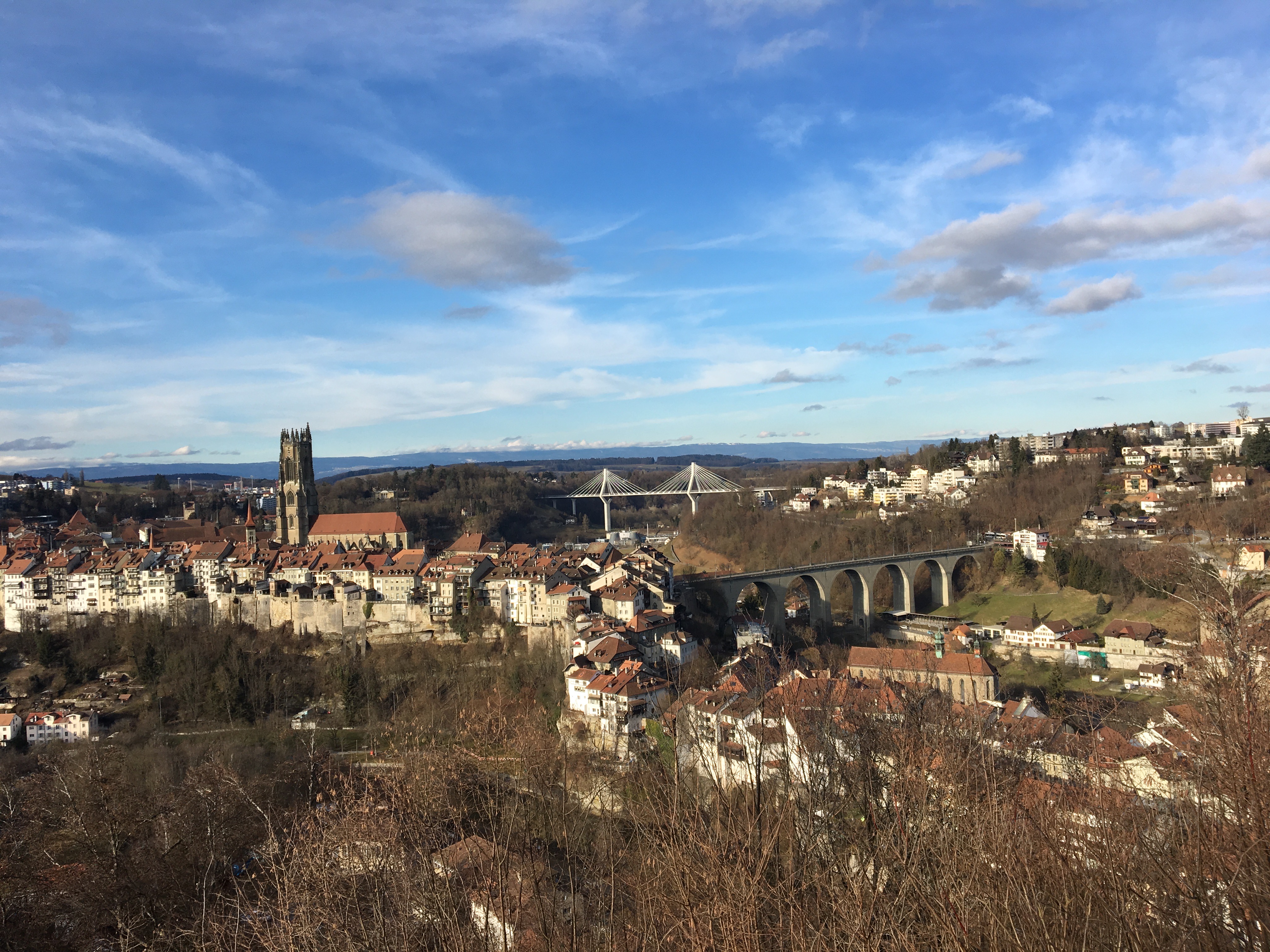 A few years ago, the completion of a new suspension bridge and the closing of the arched Zähringer Bridge diverted traffic from the neighborhood near the Cathedral and created another Fribourg landmark. (see picture)
A few years ago, the completion of a new suspension bridge and the closing of the arched Zähringer Bridge diverted traffic from the neighborhood near the Cathedral and created another Fribourg landmark. (see picture)
Official city statistics mirror the language distribution of the canton as a whole. Still, it seems that there is a greater concentration of bilinguals living in the city, which may be in part because of the university.
The University of Fribourg (created in 1889) is Switzerland's only bilingual university. Both French and German are used as languages for teaching and for the administration.
In 2009, the Institute of Multilingualism was founded, which conducts research of how multilingualism affects education, the workplace, and migration.
Because the two languages intersect throughout the city, you'll find interesting signage in French, German, and also in Swiss-German dialect (which has no standard written form).
During a visit a couple of years ago, Ulrike had a tiny cameo role in a YouTube clip "We are Happy from Fribourg" by a Fribourg film maker. He used the Pharrell Williams' song "Happy" from the movie "Despicable Me 2", similar to what other Swiss cities have done. Maybe you can spot her at ~2.36 minutes into the clip, which also shows many images of Fribourg.
In fact, she was walking through the Farmer's Market where you can always find many delightful language tidbits. This time as well.
FARMER'S MARKET
On Saturday morning, Fribourg has a farmer's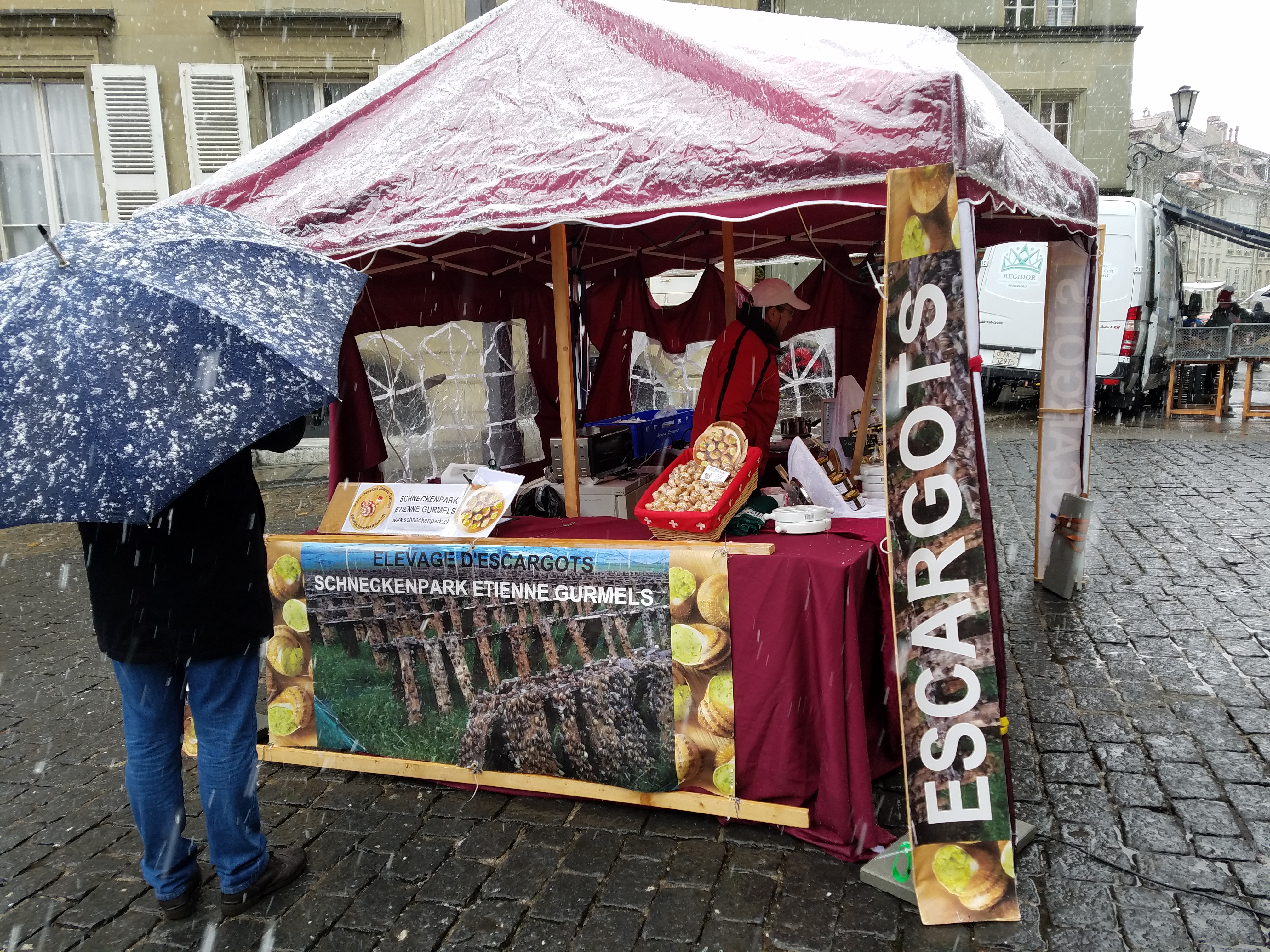 market that stretches from the City Hall Plaza down the Grand Rue. Vendors from the region as far as (French-speaking) Lausanne come to sell their wares. When I'm around, I spend an hour or so poking around and I always find some language learning opportunities.
market that stretches from the City Hall Plaza down the Grand Rue. Vendors from the region as far as (French-speaking) Lausanne come to sell their wares. When I'm around, I spend an hour or so poking around and I always find some language learning opportunities.
Interestingly, the vegetable and fruit stands seem mostly set up by farmers that speak Swiss German.
For the first time in all the years, I saw a stand that sells snails. The “Schneckenpark” translates into French as “Élevages d'Escargots.” The above picture on the front of the stand explains both expressions: the raised, slanted boards of the snails' park.
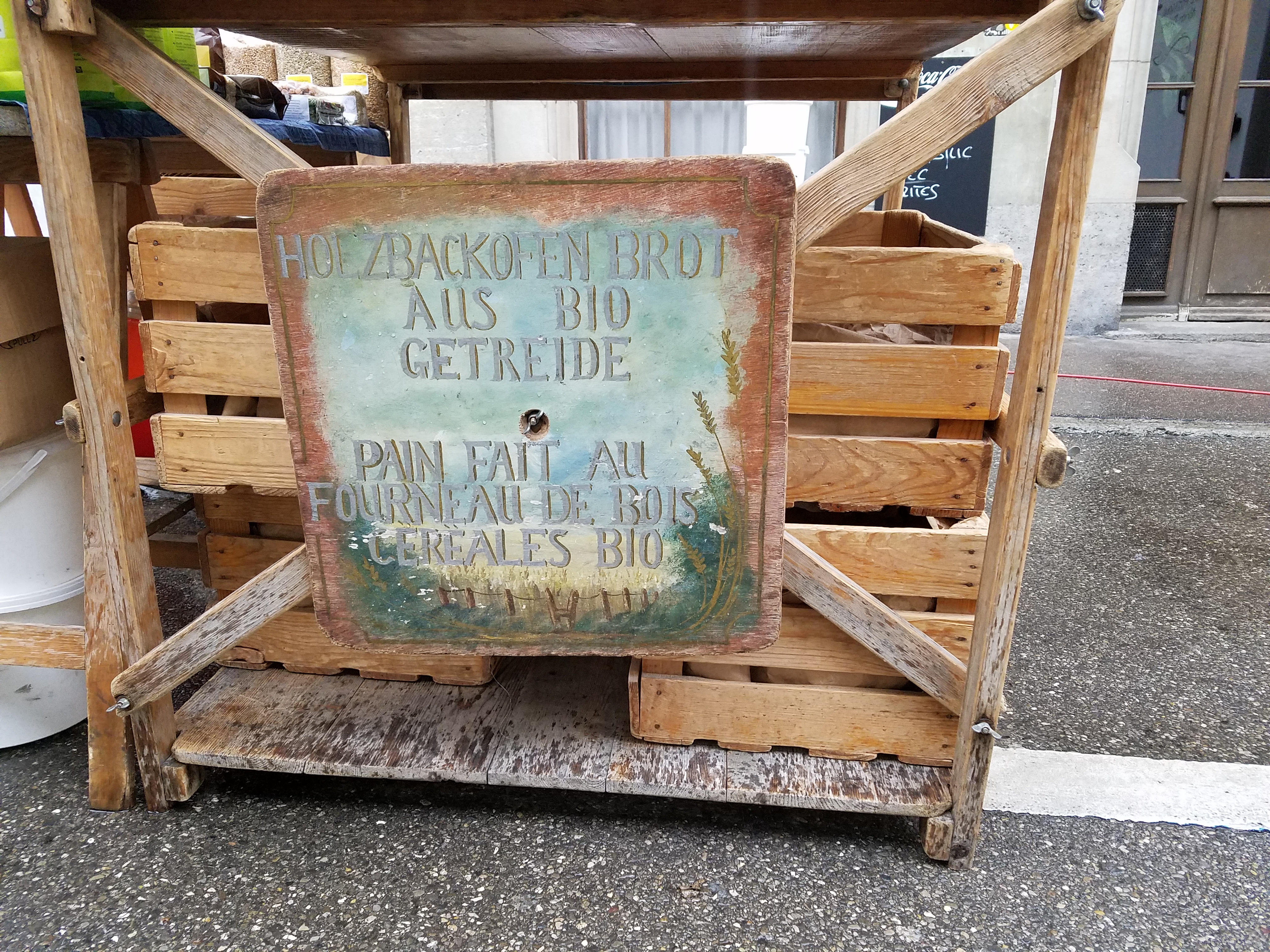 Another stand advertises in typical German compound-word fashion: “HOLZBACKOFENBROT AUS BIO GETREIDE” and with the wordier French: “PAIN FAIT AU FOURNEAU DE BOIS & CEREALES BIO.” Both translate to something like “bread made with organic flour in wood-burning oven.”
Another stand advertises in typical German compound-word fashion: “HOLZBACKOFENBROT AUS BIO GETREIDE” and with the wordier French: “PAIN FAIT AU FOURNEAU DE BOIS & CEREALES BIO.” Both translate to something like “bread made with organic flour in wood-burning oven.”
Not all stands advertise bilingually. Some have signs that are only in French or only in German. When it's Swiss German, even I sometimes need the help of a local person.
Take the sign of a Swiss-German butcher: The word “Metzger” (butcher) abbreviated to “Metzg” presents no problem. But hey, how about “gglùschtig's ù säüber gmacht's”? To decode that, I had to dig deep into my Swiss-German language memory.
The word “gglùschtig's” means “tasty, a pleasure to eat” - not to be confused with the German word “lustig” (funny). I'm not sure about the double “g” and the grave accent on the “u.” Probably, it's a way to represent Swiss-German pronunciation.
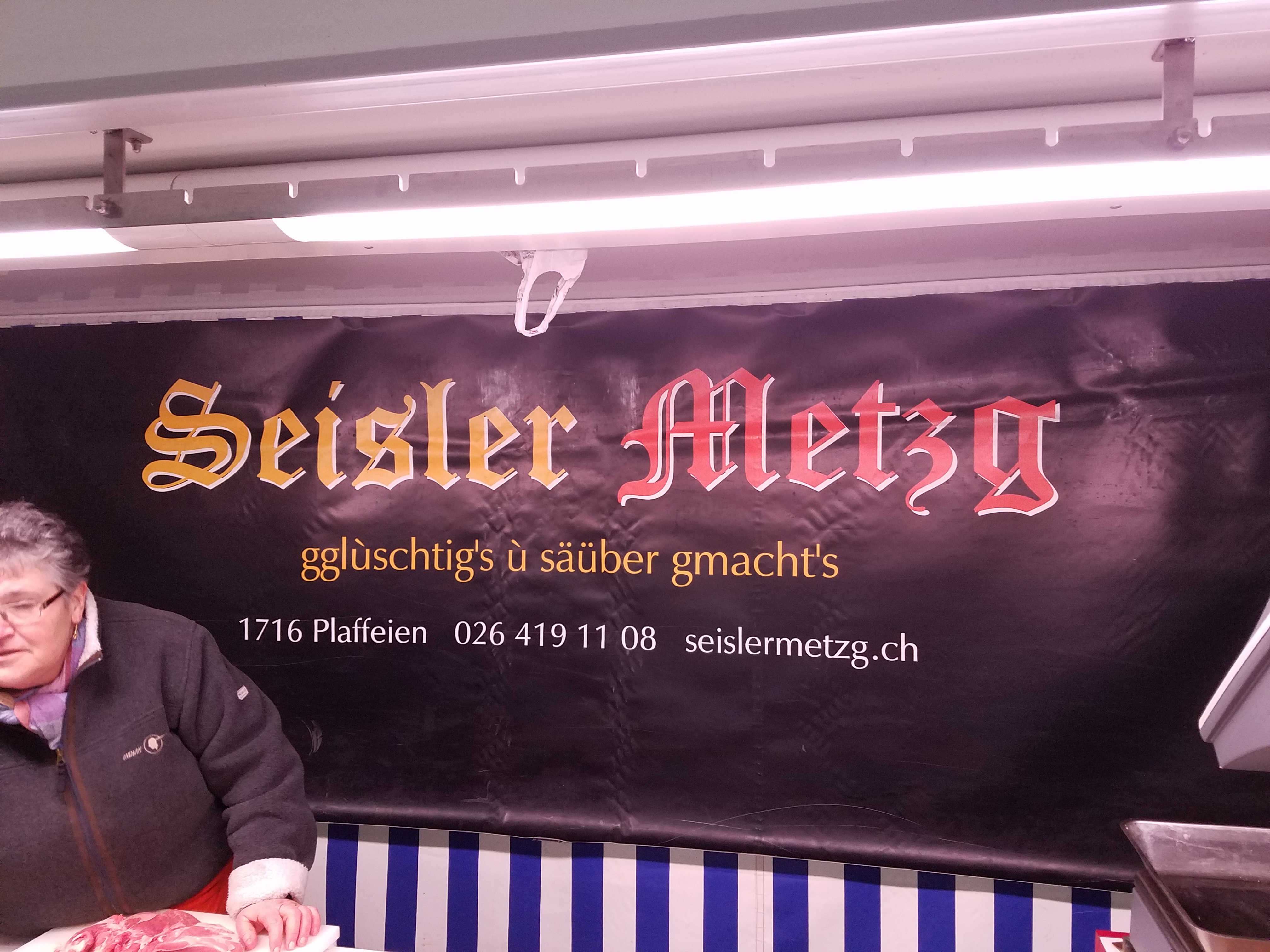 The word “säüber” is as tricky as “gglùschtig's.” One could easily confuse it with the German word “sauber” (clean). But the letter combination “äü” suggests the sound of a word closer to the German “selber” (self).
The word “säüber” is as tricky as “gglùschtig's.” One could easily confuse it with the German word “sauber” (clean). But the letter combination “äü” suggests the sound of a word closer to the German “selber” (self).
The word “gmacht's” is easy and just means “made.” The suffix “-'s” (for “Gemachtes”) adds the idea of a “made” product.
So “gglùschtig's ù säüber gmacht's” would best be translated as: “tasty andhomemade (or self-made) products.”
LANGUAGE LEARNING WITH FRENCH & GERMAN SIGNS
With its medieval town center and old ramparts, the city of Fribourg is a great place to walk around and explore. When you pay attention to street signs or signs on shops and restaurants, you'll see some interesting words and language combinations.
French sign in a restaurant window: Les croûtes auf fromage
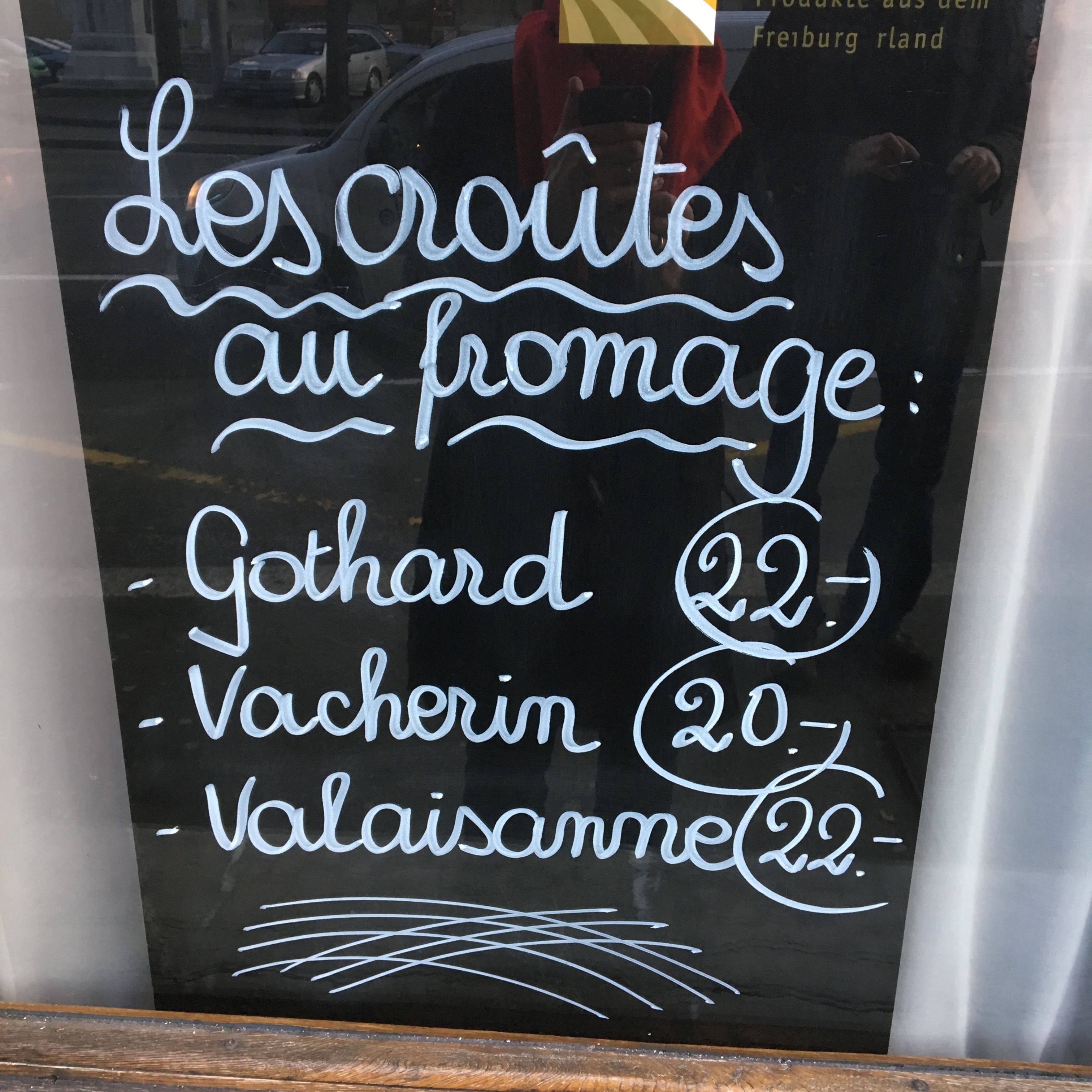 These are bread slices dipped in white wine, topped with cheese, (often also with cornichons and tomatoes) and grilled in the oven. The advertised prices and types of preparation indicate a substantial meal.
These are bread slices dipped in white wine, topped with cheese, (often also with cornichons and tomatoes) and grilled in the oven. The advertised prices and types of preparation indicate a substantial meal.
• la croûte – the rind
• le fromage – the cheese
Gothard, Vacherin, and Valaisanne are local cheeses that are very popular in the region.
Street signs combining French and German.
One of the quarters 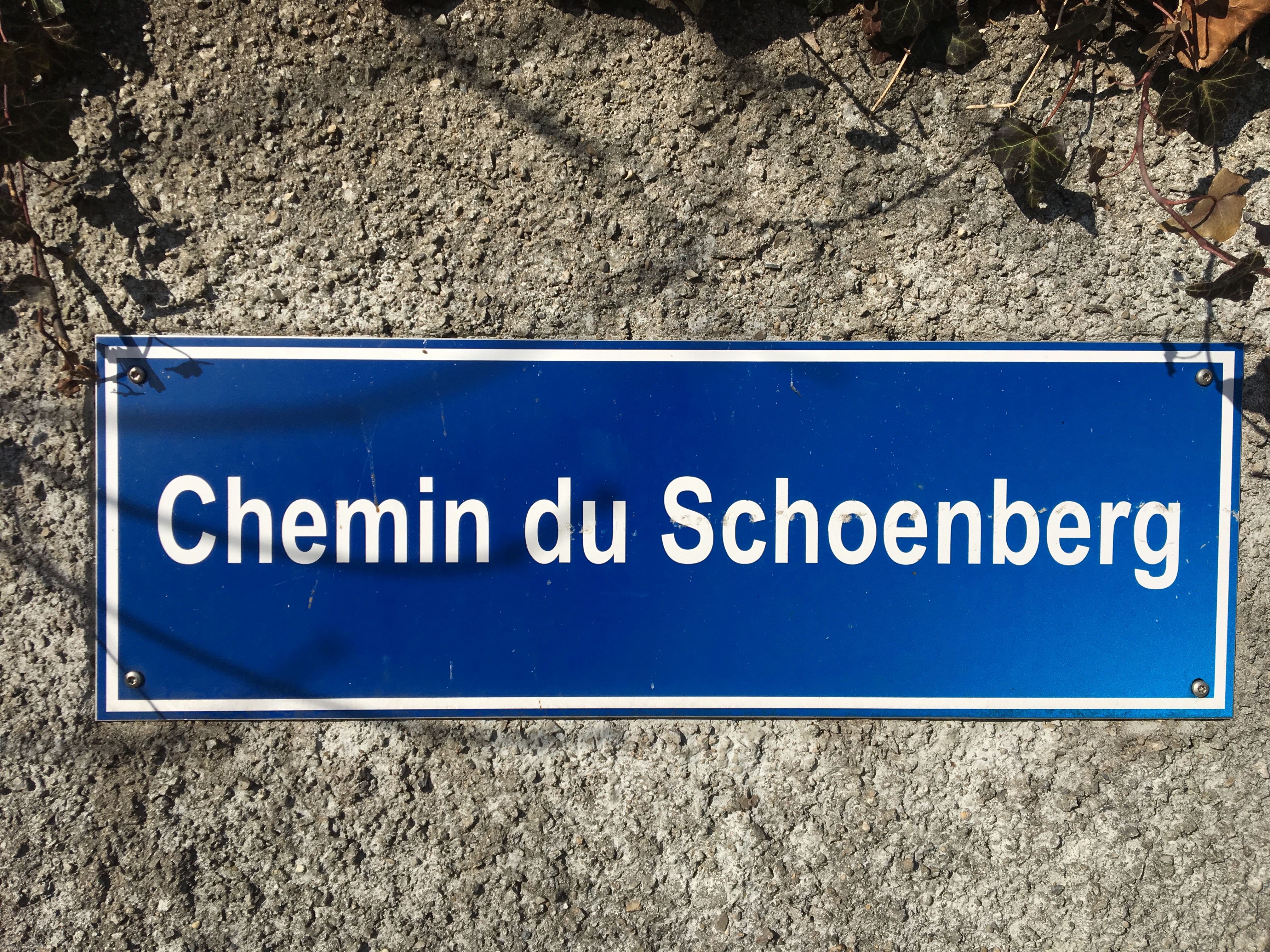 of Fribourg is called “Schoenberg,” a German word meaning “beautiful mountain.” (Note that in the French spelling, Schoenberg is spelled with an “oe”, which is also an alternate spelling in German.)
of Fribourg is called “Schoenberg,” a German word meaning “beautiful mountain.” (Note that in the French spelling, Schoenberg is spelled with an “oe”, which is also an alternate spelling in German.)
One of the roads leading up to the quarter is called “Chemin du Schoenberg” (chemin – the French word for way, path.)
Not everybody loves this French specialty: Beef Tongue
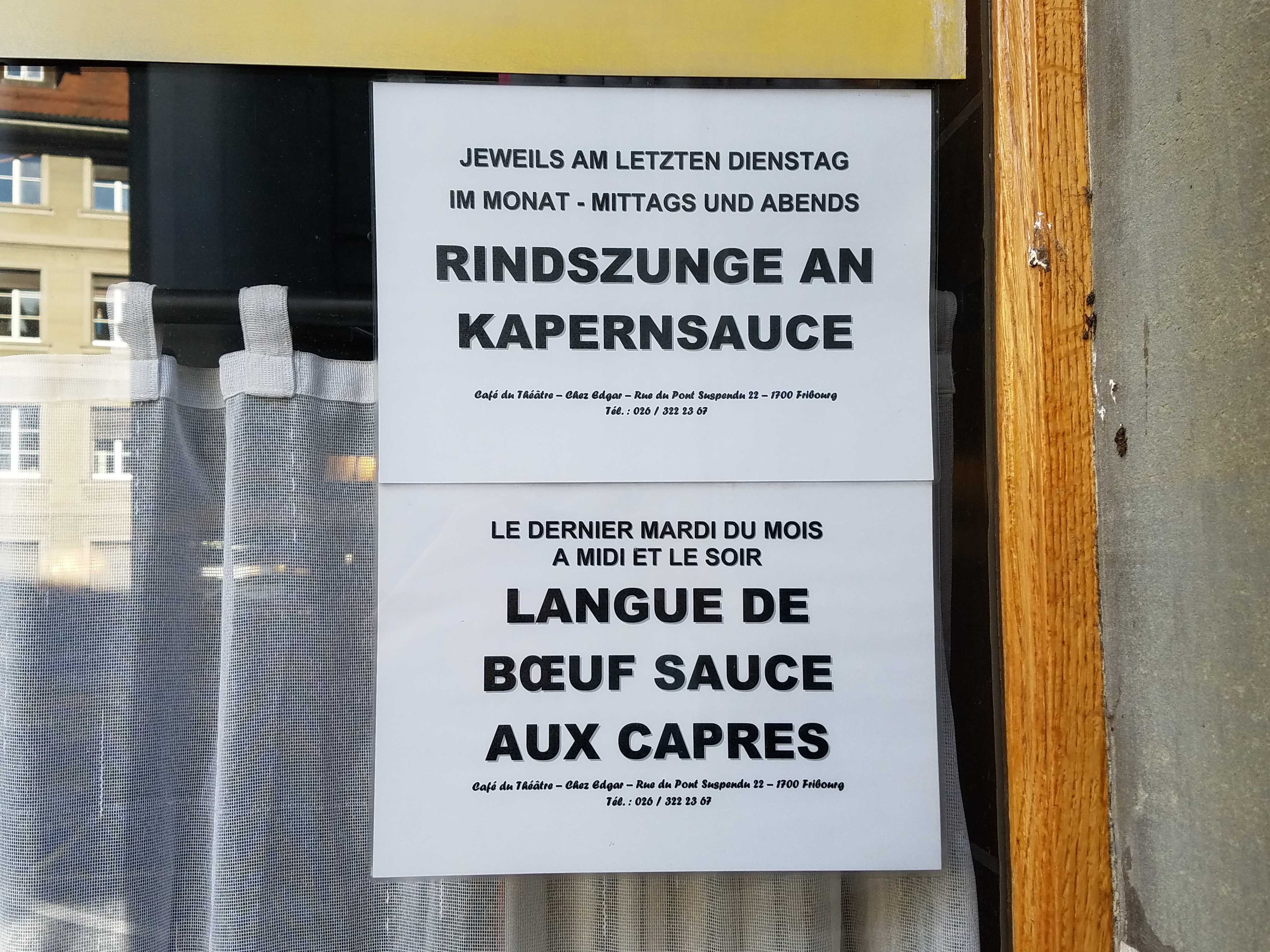 German/French sign in a restaurant window: Rindszunge/Langue de Boeuf
German/French sign in a restaurant window: Rindszunge/Langue de Boeuf
• la langue, die Zunge - the tongue
• le boeuf, das Rind - the beef
• les capres/die Kapern - the capers
German speakers may notice a spelling error on the German sign: It should say "Rindszunge IN Kapernsauce".
Strolling through the city streets you'll see many signs that make you smile.
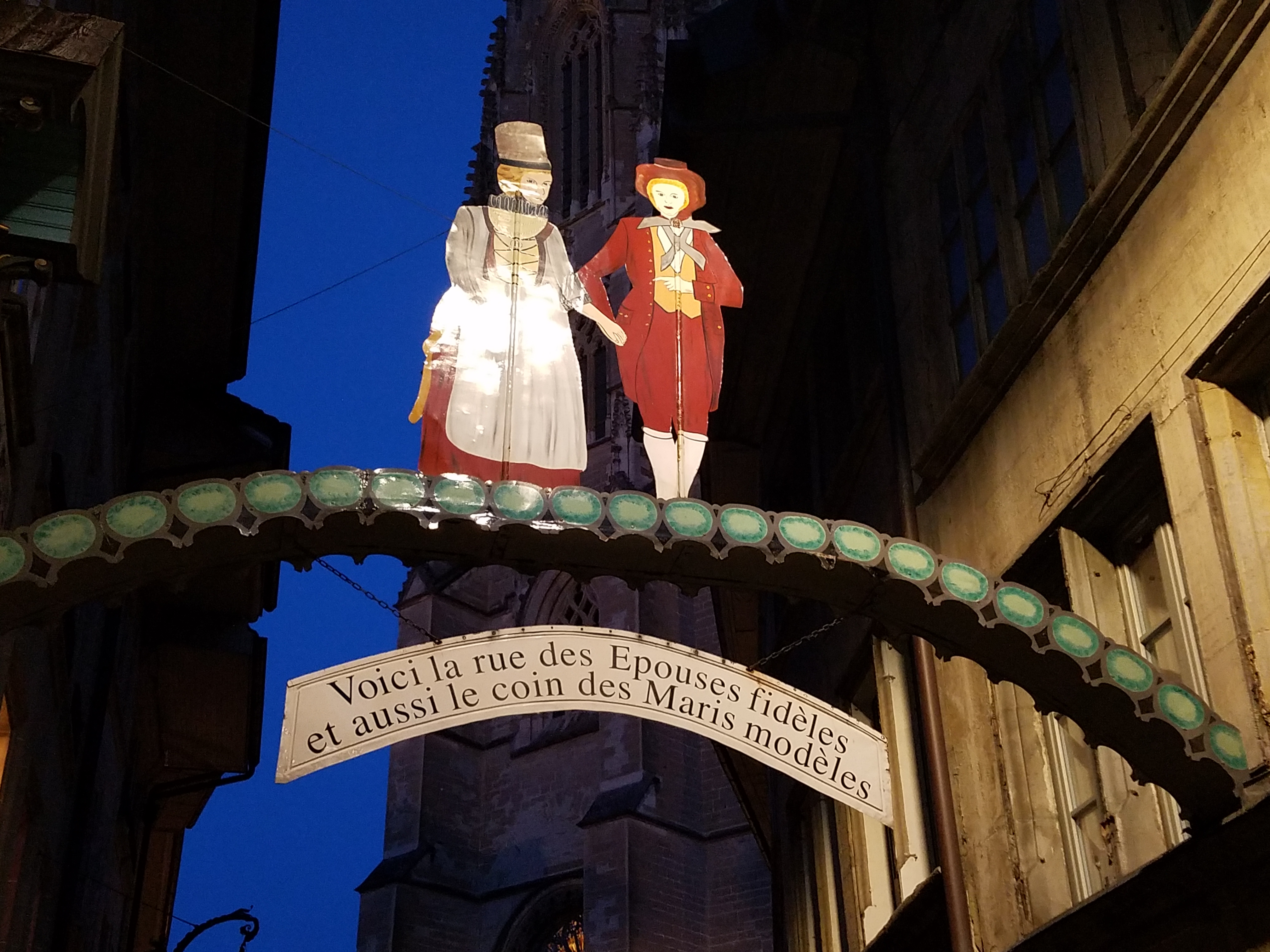 A favorite of mine is the one above the Rue des Epouses, which I described in a previous post 11 Language Clues from German and Swiss Signs. Look for item#11, if you need a translation of the French or the German, which is on the other side of the sign.
A favorite of mine is the one above the Rue des Epouses, which I described in a previous post 11 Language Clues from German and Swiss Signs. Look for item#11, if you need a translation of the French or the German, which is on the other side of the sign.
If you ever visit Fribourg and the Cathedral, or are looking for the above sign, you'll also pass by the bookshop Librairie "Bien-être" on one side, and the modern furniture store "Forme + Confort" on the other side of la Rue des Epouses.
In "Bien-être" you'll find all kinds of books (in French) about well-being, alternative medicine, etc. And - you can say hello to my sister Ingrid.
Bio: Peter Rettig is the co-founder of Gamesforlanguage.com. He is a lifelong language learner, growing up in Austria, Germany, and Switzerland. You can follow him on Facebook, Twitter and Instagram, and leave any comments with contact or below.
